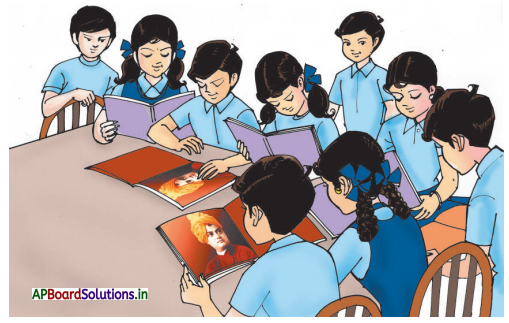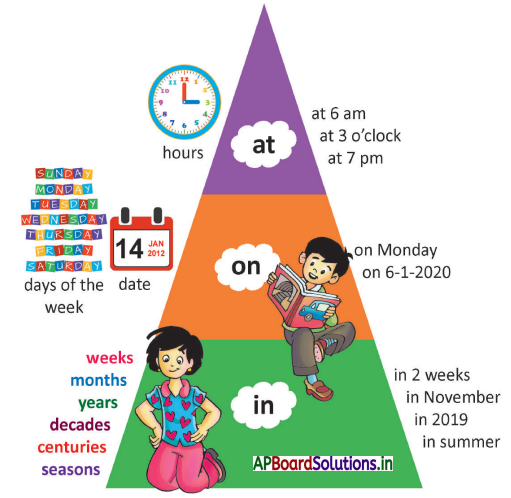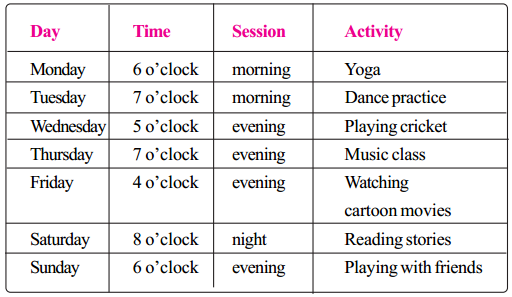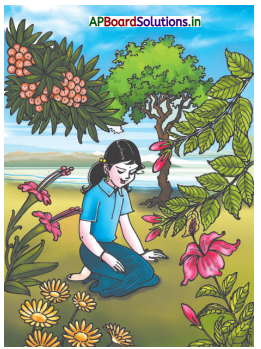Andhra Pradesh AP Board 4th Class English Solutions 4th Lesson Swami Vivekananda Textbook Exercise Questions and Answers.
AP State Syllabus 4th Class English Solutions Chapter 4 Swami Vivekananda
Textbook Page No. 47

Activity-1
I . Look at the picture and answer the questions :
Question 1.
What do you see in the picture ?
Answer:
I see a group of students sitting together.
Question 2.
What are the children doing ?
Answer:
They are reading books.
![]()
Question 3.
Can you identify the person in the books ?
Answer:
Yes.
Question 4.
Tell a few words about the person in the books.
Answer:
He is great and famous personality.
Textbook Page No. 51
Comprehension :
Activity-2
Answer the following questions.
Question 1.
Who were the parents of Vivekananda ?
Answer:
Narendranath Dutta and Bhuvaneswari Devi.
Question 2.
When was he born ?
Answer:
He was bom on 12th January, 1863.
Question 3.
How was he called in his childhood?
Answer:
He was called as Narendra in his childhood.
Question 4.
What did he say to the teacher who punished him?
Answer:
He said that, he didn’t committed any error, he was sure that he is right.
![]()
Question 5.
How did his mother console him?
Answer:
She said that not to worry if you are correct.
Question 6.
Why didn’t Narendra run away on hearing ‘Ghost’?
Answer:
Because he didn’t see the Ghost.
Question 7.
Whose teachings inspired him?
Answer:
Bhagavadgeeta and Ramakrishna Paramahamsa inspired him.
Textbook Page No. 52
Activity – 3
Complete the following sentences by choosing correct options.
1. Vivekananda’s favourite game was ( )
a) Kabaddi
b) Football
c) The King and his Court
Answer:
c) The King and his Court
2. Narendra was born in ( )
a) Howrah
b) Chennai
c) Simulia
Answer:
c) Simulia
3. His mother used to narrate stories from ( )
a) The Vedas
b) Tbe Bible
c) The Ramayana and The Mahabharata
Answer:
c) The Ramayana and The Mahabharata
![]()
Vocabulary
Activity – 4
Read the following sentences to understand the meanings of the ‘word in context.’
Posture
1. He could sit in the same posture for a long time, (pose)
2. Our teacher observed the posture of the new student, who is very disobedient.
Crawl
1. A snake crawled on the floor. (crept)
2. My younger son is just 6 months old, crawling now.
Regret
1. When the teacher realized his mistake, he regretted it. (felt sorry).
2. Ms. Shalini behaved foolishly, later she regretted for her behaviour.
Showcase
1. The incidents of his childhood showcased his courage and intelligence. (exhibited).
2. Her language showcases her attitude.
Inspire
1. Vivekananda was inspired by the teachings of Ramakrishna Paramahamsa. (motivated)
2. Gandhiji’s march to Dandi inspired many Indians.
Committed
1. I have not committed any error.
2. Our class teacher, Venkat is committed to his work.
![]()
Textbook Page No. 53
Activity-5
Choose the contextual meaning of the underlined words in the following sentences.
1. He narrated everything to his mother. ( )
A) say
B) tell
C) told
Answer:
C) told
2. Narendra is known for his intelligence. ( )
A) cleverness
B) bold
C) active
Answer:
A) cleverness
3. The passenger forgot his luggage in the train. ( )
A) recall
B) reinforce
C) failed to remember
Answer:
C) failed to remember
4. Our teacher observed the posture of the new student, who is very disobedient. ( )
A) poster
B) structure
C) pose
Answer:
C) pose
5. When the teacher realized his mistake, he regretted it. ( )
A) felt sorry
B) felt happy
C) joyful
Answer:
A) felt sorry
Textbook Page No. 54
Grammar
Read’ the following sentence and observe the underlined word. Vivekananda was bom on 12th January 1863.
In the above sentence ‘on’ is used before the date 12th January. It tells the relationship between the event or action ‘born’ and when it happened. It is called a preposition, and as it allows us to discuss a specific time period such as a date on the calendar, or one of the days of the week, or the actual time something takes place, we call it ‘Preposition of Time.’ Some Prepositions of Time are given below:
At-it is used to discuss clock times, precise time.
e.g. I shall meet you at 5 pm tomorrow.
Our school starts at 8.45 am
We clean our classroom at lunch time.
In – it is used to discuss months, seasons, years, centuries, decades, or general times of a day. ‘
e.g. Sirisha’s birthday falls in December.
Generally birds migrate in summer.
Gandhiji was born in 1869.
On- it is used to discuss certain days of the week or portions of days of the week, or specific dates.
e.g. Sachin will come on Monday.
We celebrate Independence Day on 15th August.

Leela is very punctual. She always follows the time. Leela is doing many activities along with her studies.
Here is her time table.

![]()
Textbook Page No. 56
Activity-6
Fill in the blanks with prepositions of time from the above table. One is done for you.
e.g. Leela does yoga at 6 o’clock in the morning on Monday.
1. Leela practises dance ____ Tuesday.
Answer:
Leela practises dance on Tuesday.
2. Leela plays cricket ____ 5 pm
Answer:
Leela plays cricket at 5 pm
3. Leela goes to the music class ____ Thursday.
Answer:
Leela goes to the music class on Thursday.
4. Leela watches cartoon movies _____ 4pm ____ Friday.
Answer:
Leela watches cartoon movies at 4pm on Friday.
5. Leela reads stories _____ night.
Answer:
Leela reads stories at night.
6. Leela plays with her friends ____ Sunday.
Answer:
Leela plays with her friends on Sunday.
Textbook Page No. 57
Listening and Responding
Activity-7
Read the following conversation.
Ram : When do you wake up daily in the morning?
John : I wake up at 5 am daily.
Ram : Do you go for a walk every day?
John : Yes, I go for a walk every day in the evening.
Ram : Do you drink milk every day?
John : Yes, I drink milk every day at night.
Ram : Do you read story books?
John : Yes, I read story books.
Activity-8
Tourist : We want to go to Vivekananda Rock. Would you guide us?
Tour guide : Sure, I will.
Tourist : How much do you charge?
Tour guide : Rs.500/- per day. We have to go there by a ferry.
Tourist : What’s aferry?
Tour guide : A small boat.
Tourist : How much are we charged for it?
Tour guide : Rs. 100/- per head.
Tourist : Could you show us all the places there?
Tour guide : Certainly.
Tourist : Shall we start now?
Tour guide : With pleasure.
Textbook Page No. 58
Activity-9
Read the following statements and say whether they are denoting habitual actions or not.
1. My father reads the newspaper everyday ____ yes/no
Answer: yes
2. He cooked food deliciously ____ yes/no
Answer: no
3. We play in the evening everyday _____ yes/no
Answer: yes
4. India won the world cup in 1983 _____ yes/no
Answer: no
5. Generally she helps the poor ______ yes/no
Answer: yes
6. She often goes to the cinema ____ yes/no
Answer: no
We use the simple present tense to denote habitual actions.
e.g. She sings songs on independence Day every year.
We play every day in the evening.
![]()
Textbook Page No. 58
Writing
Activity – 10
Dictation :
The teacher reads aloud the following sentences and asks the children to write them down in their note book / workbook.
1. Vivekananda was born on 12th January.
2. His favourite game was ‘The King and the Court’.
3. He was good at studies as well as games.
4. He was a brave boy.
Textbook Page No. 59
Read the following sample biographical sketch of Mahatma Gandhi.
Activity – 11
Mahatma Gandhi was born on 2nd October, 1869 at Porbandar in Gujarat. His full name was Mohanclas Karamchand Gandhi. His father’s name was Karamchand Gandhi, mother’s name was Putlibai. He was a lawyer. He fought against the British. for freedom. He preached Non-violence (ahimsa).
Activity-12
Now, write a biographical note of any friend with help of the hints given below. (Name, place of birth, date of birth, parents, studies, achievements)

Answer:
Jeevana was born on 6th November, 2011 at Tatanagar in Hyderabad. Her Fathers name is Suresh, mother’s name is Oormila. She is studying 4th class. She is good at studies and achieved several medals in painting.
Textbook Page No. 60
Sing and Enjoy
Kind Words
Poem
Kind hearts are the gardens,
Kind thougttts are the roots,
Kind words are the flowers,
Kind deeds are the fruits.
Take care of the gardens,
And keep them from weeds,
Fill, fill them with flowers,
Kind words and kind deeds.

Textbook Page No. 61
Comprehension
Activity – 13
Answer the following questions:
Question 1.
What are the gardens according to the poet?
Answer:
Kind hearts.
![]()
Question 2.
Why are kind thoughts compared to roots?
Answer:
Because thoughts are the first step to grow in our life.
Question 3.
When should we take care of the garden?
Answer:
When weeds grow in the garden.
Question 4.
Where do we find weeds?
Answer:
We find weeds in the garden.
Question 5.
Who takes care of the gardens?
Answer:
Gardener takes care of the gardens.
Swami vivekananda
Summary :
Vivekananda was bom on 12th January, 1863 to Viswanath Dutta and Bhuvaneswari Devi in Simulia, Kolkata. First, he was named veereswara. but as it was difficult to spell, everyone called him Narendra. his mother used to narrate him stories from great epics, Ramayana and Mahabharatha. In his childhood, he was very active, intelligent and playful. He had leadership qualities and was kind to animals and birds, his favorite game was ‘The king and the court’. He and his friends practised meditation and he looked like a Buddha. One day, when a snake came, everyone ran away but he didn’t move from his palace. He was good at studies as well as games.
He listened to everything very carefully. One day, he was punished by his teacher. Then, he protested saying that he was right. Then, the teacher slapped him. He returned home crying. His mother consoled him by saying him not to worry when he did right. One day, all his friends ran away listening that there was ghost in the tree. But he was fearless as he didn’t see it. He became a great leader Swami Vivekananda. He was inspired by teaching of Bhagavadgita and his teacher Rama Krishna Paramahamsa.
సారాంశము
వివేకానంద జనవరి 12న, 1863వ సంవత్సరంలో విశ్వనాథ్ దత్తా, భువనేశ్వరి దేవి దంపతులకు సిములా, కలకత్తాలో జన్మించాడు. మొదటిగా తనను అందరూ వీరేశ్వరా అని పిలిచేవారు. కానీ అలా పిలవడం ఇబ్బంది కావడంతో, అందరూ నరేంద్ర అని పిలవసాగారు. నరేంద్రుడికి అతని అమ్మ రామాయణ, మహాభారత ఇతిహాసాలను బోధించేది. తన చిన్నతనంలో ఎంతో చలాకీగా, తెలివిగా ఉండేవాడు. నాయకత్వ లక్షణాలతో ఉండేవాడు. జంతువులు, పక్షులను ఎంతో ఆదరించేవాడు. తనకు ఇష్టమైన ఆట ‘ది కింగ్ అండ్ ది కోర్ట్’. తన స్నేహితులతో కలిసి ధ్యానం సాధన చేసేవాడు. ఒక రోజు వారు ఆడుకునే స్థలంలో ఒక పాము వచ్చింది. ఆ పామును చూసి అందరూ భయపడ్డారు.
కానీ నరేంద్రుడు మాత్రం అస్సలు కదలలేదు. నరేంద్రుడు చదువులో, ఆటలలో ముందుండేవాడు. ఒకసారి తన గురువు నరేంద్రుడిని దండించాడు. అయినా తన తప్పులేదు అనడంతో గురువు తనను కొట్టారు. దాంతో ఏడుస్తూ ఇంటికి వెళ్తాడు. నరేంద్రుడు తల్లి తనను ‘మనం తప్పు చేయకపోతే బాధపడకూడదు అని ఓదార్చింది. ఒకరోజు, చెట్టులో దెయ్యం ఉందని తమ స్నేహితులందరూ పరుగులు తీశారు. కానీ నరేంద్రుడు మాత్రం తనకు దెయ్యం కనిపించకపోవడంతో అక్కడ నుంచి కదల్లేదు. నరేంద్రుడు ‘స్వామి వివేకానందా’గా ఎంతో గొప్ప నాయకుడు అయ్యాడు. తనకు భగవద్గీత మరియు అతని గురువు రామకృష్ణ పరమహంస ఎంతో స్ఫూర్తిని ఇచ్చారు.
Glossary
narrate = explaining in detail, tell; వివరించు,
epic = story of a traditional hero; ఇతిహాసము
intelligence = wisdom; తెలివి
regret = feel sorry; విచారము ప్రకటించు
meditation = a devotional exercise, a deep concentration; ధ్యానము
protest = making a strong objection; ప్రతిఘటించు
console = comfort in a time of grief; సానుభూతి తెలియజేయు
spiritual = sacred; ఆధ్యాత్మిక
concentration= attention towards something; శ్రద్ధ